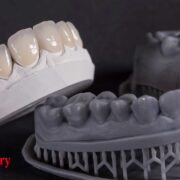Here at the Royal Dental Clinics, your dental health is our number one concern, therefore we’re glad you found our blog. This article will discuss tartar accumulation on your teeth, a common dental disease that frequently goes unseen but may have major repercussions if left untreated. As a trusted dentist, Dr. Chirag Chamria is here to enlighten you about the dangers of tartar and the importance of regular dental care. Let’s dive in and discover how this seemingly harmless substance can wreak havoc on your oral health.
Understanding Tooth Tartar Formation
Tartar formation is a common dental issue that occurs when plaque, a sticky film of bacteria, is not effectively removed from the teeth. Plaque is constantly forming on the surfaces of our teeth, and if not adequately removed, it can harden and turn into tartar.
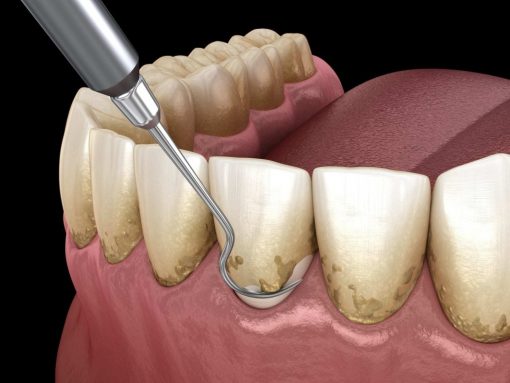
Here’s a breakdown of how tartar forms
Plaque Formation: Plaque is formed when bacteria in the mouth combine with food particles and saliva. This sticky film adheres to the surfaces of the teeth, including the gum line.
Mineralization: Over time, minerals such as calcium and phosphate found in saliva mix with the plaque, causing it to harden and form tartar. This process is known as mineralization or calcification.
Tartar Buildup: Tartar typically forms near the gum line and between the teeth, areas that are challenging to reach and clean with a toothbrush or floss. It appears as a hard, yellow or brownish deposit that is firmly attached to the tooth surface.
Factors Affecting Tartar Formation
Several factors can contribute to the formation of tartar on your teeth:
Inadequate Oral Hygiene: Poor oral hygiene habits, such as irregular or ineffective brushing and flossing, can lead to the accumulation of plaque and subsequent tartar formation.
Saliva Composition: The composition of your saliva plays a role in tartar formation. Some individuals naturally produce more tartar-causing minerals in their saliva, making them more prone to tartar buildup.
Diet: A diet high in sugary and starchy foods provides fuel for the bacteria in plaque to thrive. These bacteria produce acids that can damage tooth enamel and contribute to tartar formation.
Dry Mouth: Reduced saliva flow, often caused by certain medications or medical conditions, can increase the risk of tartar formation. Saliva helps to wash away food particles and neutralize acids, so a dry mouth environment can lead to plaque accumulation.
Smoking and Tobacco Use: Tobacco use, including smoking and chewing tobacco, can contribute to tartar formation. The chemicals in tobacco products can promote plaque buildup and interfere with the natural self-cleaning mechanisms of the mouth.
Consequences of Untreated Tartar on Tooth
Gum Disease: Tartar buildup provides an ideal environment for bacteria to thrive, leading to gum inflammation and gingivitis. If left untreated, gingivitis can progress to periodontitis, a severe form of gum disease that can cause tooth loss.
Bad Breath: The bacteria present in tartar produce foul-smelling substances, leading to chronic bad breath or halitosis. No matter how much mouthwash or breath mints you use, the underlying issue of tartar must be addressed for long-lasting fresh breath.
Tooth Decay: Tartar buildup near the gum line can make it harder to clean your teeth effectively, leading to an increased risk of cavities. The bacteria residing in the tartar produce acids that attack the tooth enamel, causing decay and potential tooth loss.
Tooth Sensitivity: The hardened tartar can also contribute to tooth sensitivity, making it uncomfortable or painful to consume hot or cold foods and drinks. Sensitivity may indicate that the tartar has progressed and compromised the protective enamel layer.
Importance of Dental Cleaning in Tooth Tartar
Regular dental cleanings are essential to remove tartar buildup and maintain optimal oral health. During these visits, a dental hygienist or dentist will use specialized instruments to scrape away the tartar from your teeth. This process, known as scaling, effectively removes the hardened deposits that cannot be eliminated through regular brushing and flossing. Professional cleanings also allow your dentist to examine your oral health and address any other issues that may be present.
Prevention is the Key | Tooth Tartar

Brushing: Brush your teeth at least twice a day with fluoride toothpaste. Use a soft-bristled toothbrush and gentle, circular motions to effectively remove plaque.
Flossing: Clean between your teeth daily using dental floss or interdental cleaners. This helps remove plaque and food particles from areas that a toothbrush cannot reach.
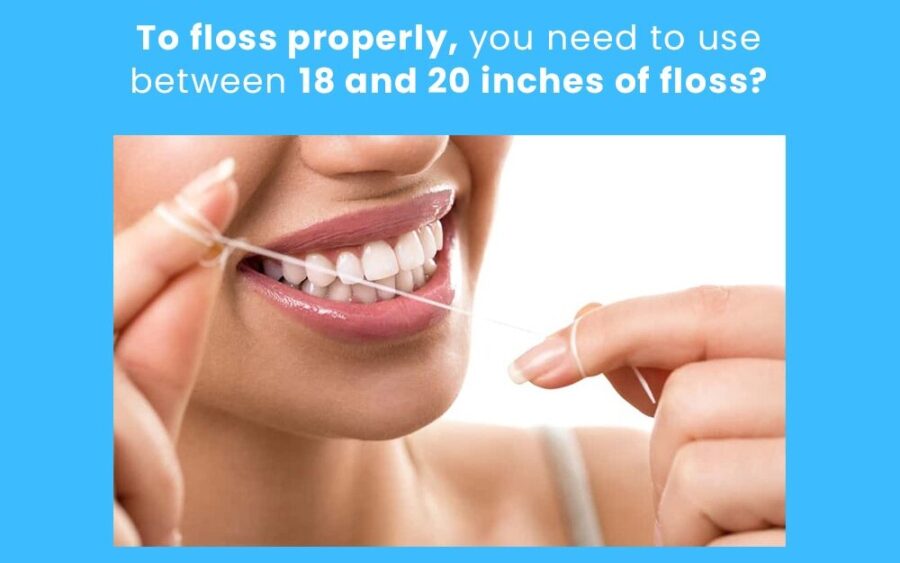
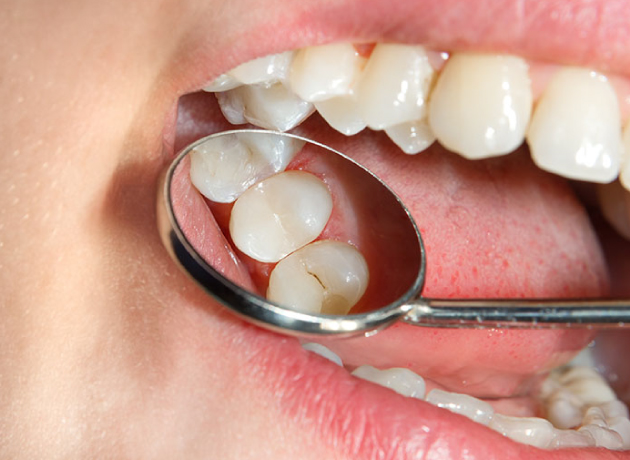
Regular Dental Check-ups: Schedule routine dental check-ups every six months or as recommended by your dentist. Professional cleanings by a dental hygienist or dentist are essential for removing tartar and detecting any early signs of dental problems.
Tartar Control Toothpaste: Consider using toothpaste that is specifically formulated to help control tartar buildup. These toothpastes often contain ingredients that help inhibit tartar formation.


Healthy Diet: Maintain a balanced diet low in sugary and starchy foods. Instead, opt for a variety of fruits, vegetables, lean proteins, and whole grains. Drinking plenty of water also helps to rinse away food particles and maintain saliva flow.
Professional Treatment Options | Tooth Tartar
If tooth tartar buildup has already occurred, don’t panic. Your dentist has several treatment options available to address the issue:
Scaling and Root Planning: They may be advised for moderate tartar accumulation. This procedure involves a deep cleaning below the gum line to remove tartar and smoothen the tooth roots, promoting gum reattachment.
Dental Procedures: In cases where tartar has caused significant damage, additional dental procedures may be necessary. These may include dental fillings for cavities, gum surgery for advanced gum disease, or tooth extraction for severely affected teeth.
Importance of Regular Oral Care Habits
Regular oral care habits are crucial for maintaining optimal oral health and preventing dental issues. Consistent oral care not only helps keep your teeth and gums healthy but also contributes to your overall well-being. Let’s explore the importance of regular oral care habits:
Prevention of Dental Problems
Practicing good oral hygiene habits, such as brushing and flossing, helps remove plaque, the sticky film of bacteria that forms on your teeth. By removing plaque regularly, you can prevent its accumulation and reduce the risk of developing dental problems such as tooth decay, gum disease, and bad breath.
Tooth Decay Prevention
Effective brushing and flossing help remove food particles and bacteria that can lead to tooth decay. Tooth decay occurs when the acids produced by plaque attack the tooth enamel, leading to cavities. Regular oral care habits help remove plaque and prevent the buildup of harmful bacteria, reducing the likelihood of tooth decay.
Gum Disease Prevention
Gum disease, also known as periodontal disease, is a common oral health issue that can lead to gum inflammation, tooth loss, and other complications if left untreated. Regular brushing, flossing, and professional dental cleanings help remove plaque and prevent the development of gum disease. Maintaining healthy gums is essential for preserving the supporting structures of your teeth.
Fresh Breath
Consistent oral care habits play a significant role in maintaining fresh breath. Brushing your teeth, tongue, and gums helps remove bacteria and food particles that can cause bad breath. Flossing is also essential, as it removes trapped food particles between the teeth that can contribute to unpleasant odors.
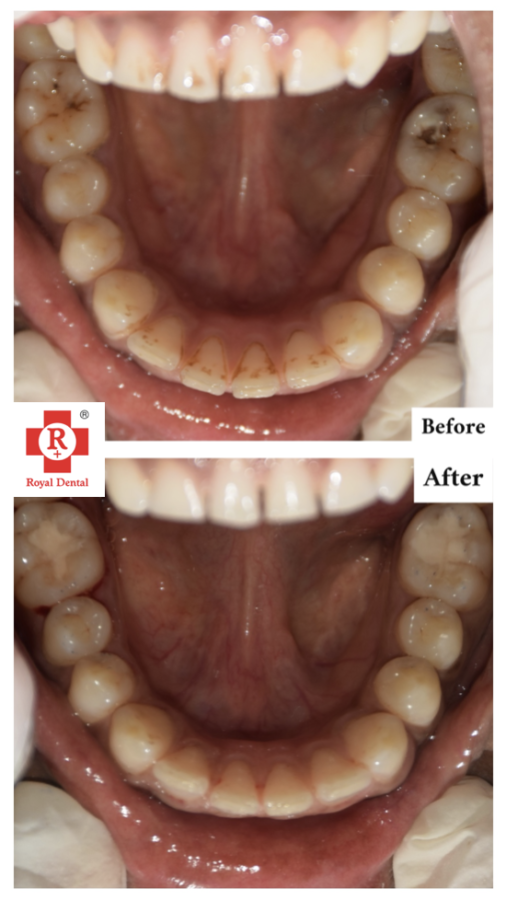
Overall Health Benefits
Oral health is closely linked to overall health. Poor oral hygiene is connected to heart disease, diabetes, lung disorders, and preterm delivery. By maintaining regular oral care habits, you can potentially reduce the risk of these health issues and promote overall well-being.
Early Detection of Dental Problems
Regular dental check-ups allow your dentist to monitor your oral health closely. Through professional examinations and X-rays, they can detect early signs of dental problems such as tooth decay, gum disease, and oral cancer. Early detection enables timely intervention and treatment, preventing the progression of these issues and minimizing potential complications.
Conclusion
Tartar buildup on your teeth is not something to be taken lightly. It can lead to severe oral health problems, including gum disease, bad breath, tooth decay, and sensitivity. To protect your oral health, it is essential to maintain good oral hygiene practices, schedule regular dental check-ups, and seek professional treatment when necessary. Keep in mind that Dr. Chirag Chamria and the rest of the staff at Royal Dental Clinics are always available to answer your questions and help you make decisions about your oral health. Don’t let tartar undermine your oral health—take action today!
© All rights reserved by Royal Dental Implants Pvt Ltd
Issued in public interest


